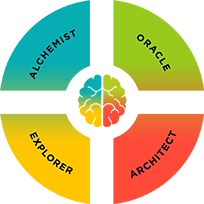Total Reading Time: 6 minutes
My friend Jonathan is the kind of guy who shows up at the airport and purchases a flight the day of his departure. He doesn’t make appointments, he rarely commits to events in advance, and hardly ever prepares for anything. He’s a happy-go-lucky guy and believes in living as spontaneously as possible.
You could say Jonathan is living for today.
My friend Rachel is driven by success. She lives by her calendar and knows exactly where she’ll be at any given time in the next three months. She’s organized and will always give you a yes or no answer. She loves to plan ahead, and endlessly researches her options before making decisions. She enjoys being in control, and likes to stick to a plan.
You could say Rachel is living for tomorrow.
My friend Ricardo is apathetic. He generally appears to be sad/depressed, and doesn’t get excited very easily. He tends to be negative toward himself and others. He views the world in a cynical way, and believes most people are bad. He likes to take the easy way out, and would rather most people left him alone.
You could say Ricardo is living in the past.
Jonathan, Rachel, and Ricardo are three people I was thinking about a lot during my recent trip to Brazil. At times, I found myself wavering between the present and the future. Frustrations with technology (lack of Wi-Fi) and deadlines (that I’d given myself) had me living in the future. The raw energy of the World Cup and its significance in my life had me living in the present.
I couldn’t quite settle, so I kept straddling. After spending some time reflecting on this, I divided us humans into four different personality types and studied each of their habits/lifestyles. Within these personality types we’ll analyze the character traits and identify the correlations to happiness.
What Is “Happy” and Why Is It so Difficult?
Most of what we know about happiness is wrong. Pursuing happiness is just that — an endless pursuit of an unattainable reality.
This isn’t as somber as it sounds, I promise. Being aware of this hoax is the first step. Below, you’ll learn about an alternative angle that is both attainable and worthwhile.
We’re all craving this feeling of happiness, but we’re not able to hold onto it beyond temporary moments of joy. Why should happiness be this complicated? Who are these rare people that appear to be happy all the time? What makes them special?
Happy is an emotion. Emotions are temporary, they’re constantly changing. We can change our emotional states, but we can’t always control them.
Our emotions should be used as a tool. For example, if we’re feeling sad that’s our emotions telling our brain, “Umm…excuse me, change something fast! Or else I’ll just keep feeling sad over here.” Unfortunately, we identify with our emotions and allow them to control us, rather than use them as the tool that they are.
Happiness, on the other hand, is this idea that maybe one day we’ll just be happy forever. Long-term infinite happy = happiness.
In essence, being happy for more than a temporary amount of time is not possible.
So what would Jonathan, Rachel, and Ricardo say? They’re living in a way that feels natural to them. It’s likely they (like us) were programmed to act this way from a very young age. Most of us don’t think twice about these habits — yet they identify who we are.
Should we succumb to living by past (ineffective) virtues? Should we be shaped by people and events from our past? Let’s examine the fundamentals by which these people live.
Jonathan: The Happy-Go-Lucky Adventurer
Jonathan’s free-flowing lifestyle could be considered hippy or Eastern by many. He dislikes commitment, but if you asked him he’d tell you spontaneity is the preference. Jonathan is indeed very present, and he’s generally happy. He lives for today and has no regrets. He doesn’t however exude much aspiration or have grand goals for the future.
People like Jonathan will generally allow (and embrace) life coming at them. He makes living in the moment a priority and works hard to maintain that virtue.
Rachel: The Ravenous Futurist
Rachel is an achiever. She lives for the future. She’s not all that happy right now, but she believes that when that big day comes (when she’s achieved all her dreams), she’ll be happy. Rachel is always busy and has trouble getting into a flow, because she finds it hard to be present.
Note: Rachel is very stereotypical of many entrepreneurs and solopreneurs.
Rachel is committed to growing. She “gets it” when it comes to success. Unfortunately, her desire to control everything in her environment leads to stress. It also leads to periods of anxiety she can’t control.
Ricardo: The Apathetic Negatron
Ricardo is bored. He allows himself to float along the river of life, and feels like a victim of the world. He isn’t happy and doesn’t see much hope for change. His cynicism only feeds his dwindling hope, and after years of this he’s become quite miserable. Ricardo has lost the ability to see the beauty of life. He attaches no meaning or significance to his time here.
We now understand these three mindsets and lifestyles. Let’s recap:
Jonathan is generally happy and lives in the present, Rachel is rarely happy and lives in the future, and Ricardo…just doesn’t give a sh*t. As I mentioned above, let’s forget about the pursuit of happiness. Let’s focus on something better: fulfillment.
In order to truly be fulfilled we need two things: to grow and to contribute. By living in the trap of the three realities above, you’re missing these two things.
You: The Fulfilled Rockstar
Now here comes…you.
You are in awe every day with the magic of life. You aren’t concerned with being happy all the time, because you know that’s not possible. Life comes with its ups and downs, all you can do is limit your suffering. Your concern is to be fulfilled.
You have goals for the future (big ones) that you’re working toward every day, but you aren’t attached to the result or goal itself. You live with gratitude every day. You know to feel grateful you must appreciate what you already have, and that this is the first step to getting more of what you want.
You balance your needs for spontaneity and security. You welcome new experiences. You let go enough to enjoy the serendipity of life. You don’t live for the pursuit of happiness, wealth, or some elaborate and grandiose vision. Your reality is rooted in the present, while being excited and optimistic of the future.
You dedicate yourself to growth and creating value for others, because that increases your sense of significance and contribution. Your life is driven by a deep purpose.
You are fulfilled. You have an underlying sense of contentment, significance, and gratification. Your fulfillment magnifies the positive and reduces the negative.
What’s the fastest way to shift into feeling fulfilled?
Look back at what you’ve already accomplished, rather than forward at all you haven’t. — Tweet this!
Always look for the lesson in life. Know that what you once considered failures are actually just temporary hiccups, designed to be training along the way. These experiences are what will allow you to contribute to others and feel true fulfillment.
To contribute, we must grow. To grow, we must experience. And to experience, we must take action and let go.
So go on and be that inspiring example of the fulfilled rockstar you already are.
##
What do you think about happiness? How will you incorporate this idea of being fulfilled in your life?
Supplemental Resources:
- The Science of Happiness – An Experiment in Gratitude
- Gratitude: Louie Schwartzberg at TEDxSF
- Harvard Magazine: Science of Happiness
Photo credit: Snowboarding in Maldvies — CC License






